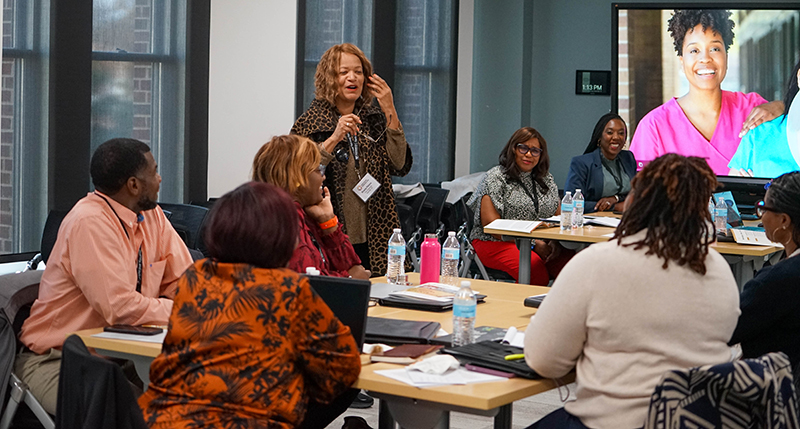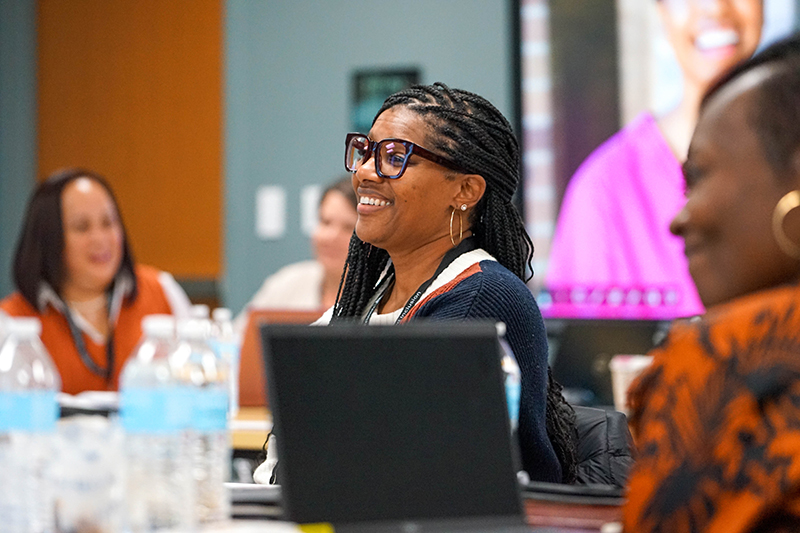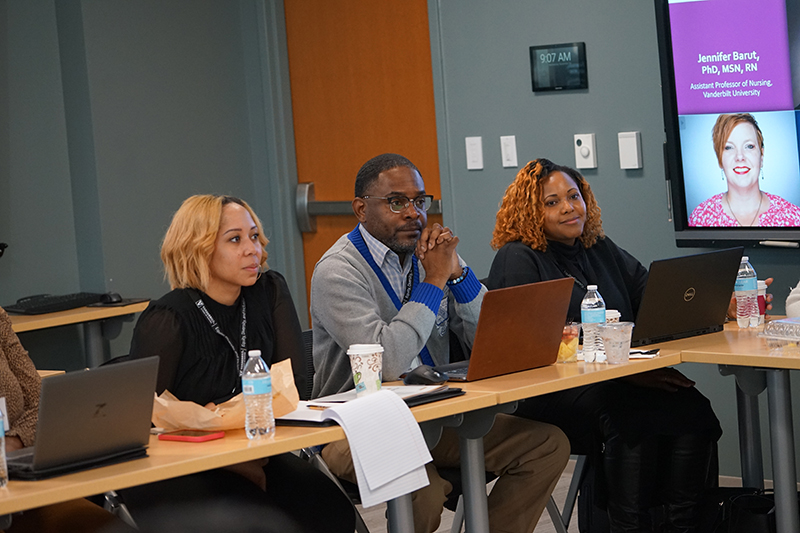
Vanderbilt academy addresses uniqueness and unique needs of diverse leaders
The sun was shining as a group of nurses from eight different states stepped out of the Vanderbilt University School of Nursing—newly invigorated to take on the challenges they face as diverse nurse leaders. The 18 nurses made up the first cohort in the five-day Academy for Diverse Emerging Nurse Leaders held at the School of Nursing in November.
“I learned so much about myself and the support I have around me,” says participant Nicole Mei Tan, RN, a clinical staff leader at Vanderbilt University Medical Center. “The academy opened so many opportunities for me that I did not see before, because of how I thought of myself. And with the support from

single person in the academy—nursing and community leaders, speakers, academy organizers and fellow students—I am able to do more as a leader and explore more opportunities.
Addressing a Need
The academy, a joint effort of VUSN and VUMC, was the product of a task force that conceptualized and planned it. Early in the planning process, a focus group of nurses from underrepresented populations revealed that they had specific needs regarding leadership and wanted opportunities to work with mentors and create a clear path toward leadership.
“The number of diverse administrators in nursing is limited,” explains VUSN Associate Dean for Equity, Diversity and Inclusion and academy Co-Director Rolanda Johnson, PhD’98. “We saw the need to help grow and create a pipeline for diverse leaders at Vanderbilt and other institutions in health care and academia.”
The academy focused on early-career leaders, those with less than three years of managerial experience. It offered an in-person immersive experience with sessions on strategic planning, finance operations, conflict resolution and even leadership presence to help participants develop a vision for how they would like to lead. It also included sessions on CliftonStrengths and Myers-Briggs personality types, racism mitigation, health equity, team building, mentorship, maintaining values, financial management and life and stress management.
A major initiative like the Academy for Diverse Emerging Nurse Leaders doesn’t occur without the hard work and creativity of talented leaders and educators,” —Pamela R. Jeffries
As the five-day event began, attendees said they felt uncertain of what to expect, but as the sessions went on, they built connections and confidence, and felt the support of their cohort. Through classroom presentations, discussions and case studies, the program helped attendees navigate how to use their voices and presence, and how to handle encounters with racism and discrimination.
“One participant said, ‘It has not only changed my professional career, it changed me personally because I was supported and I felt seen, and the things that I have dealt with were addressed,’” says VUMC Senior Director for Nurse Diversity and Inclusion and academy Co-Director Mamie Williams, PhD. “I think they came into it expecting the status quo, in terms of leadership training, but we addressed the uniqueness of being a diverse leader and how to navigate that space.”

Participants enjoyed the relatively small cohort size, which offered enough people for relationship building, but also allowed one-on-one interactions and learning. They said they left the program feeling empowered, with re-strengthened resilience.
“I’m not in alone with the many issues I have faced and continue to face as an emerging minority leader,” says Michael L. Jones, PhD, assistant dean for DEI at East Carolina University. “The most moving experience was hearing the stories of, not only my fellow academy cohort members, but also the various speakers who shared with us their lived experiences, which were not very different from my own,” Jones says. Listening to their lived experiences enabled me to learn new tools and approaches to go back to my institution to create change.”
Williams says, “A number of them said the program gave them energy, inspiration and motivation to continue in their roles, and that they felt more empowered to be their authentic selves and to lead.”
At the final session, called Lessons Learned as Leaders, participants and speakers discussed their career paths and each shared one pearl of wisdom.
“It was so engaging, you could have heard a pin drop,” Johnson says, adding that the shared experience helped participants connect, and that many left with tearful goodbyes.
“They formed very strong bonds and very strong relationships with one another. I think that will continue throughout their careers, and these will be people that they can rely on to offer them advice, support and encouragement,” Williams says.
Many participants called the event’s reception featuring high-level Middle Tennessee leaders “transformative.” “We had an opportunity to engage directly with these dynamic speakers and leaders during brief one-on-one interactions,” Jones says. “As an emerging leader, it’s important to sit at the feet of established leaders to further hone in on my own leadership skills and learn how to best develop them.”
Paying It Forward
After the in-person conference, the academy fellows participate in additional virtual sessions with their cohort and the academy co-directors. As part of the application process, fellows identified projects to work on during their fellowship year and address needs at their workplaces.
As the projects help them build confidence and grow professionally, they are mentored by one of the national nurse leaders who presented at the conference.
“We wanted the projects to benefit them and their institutions, having worked through the project—reaching out to stakeholders, identifying the situation and its background, coming up with recommendations, and then taking that and selling it to their colleagues and leaders—we wanted them to go through those steps,” Williams says, adding that project areas included problem solving, recruitment, staffing, retention and mentorship.
Tan focused her project on migrant nurses. “I am on the initial phase of my project but once it starts moving, I am hoping not to only help with the nurse staffing and retention efforts, but also help in providing support to migrant nurses—making their transition easier,” she says.
Paying it forward is a major component of the academy’s purpose.
“We want these diverse nurses to not just ascend, but to pull others up with them,” Williams says. “They will mentor, inspire and move forward that next group of diverse nurse leaders.”
Future Plans
“A major initiative like the Academy for Diverse Emerging Nurse Leaders doesn’t occur without the hard work and creativity of talented leaders and
educators,” says Pamela R. Jeffries, PhD, FAAN, ANEF, FSSH, dean of Vanderbilt School of Nursing. “At Vanderbilt, we are very fortunate to have Rolanda Johnson and Mamie Williams co-direct this most important program for early-career nurse leaders. We are exceedingly grateful for their work and dedication. This pioneering program would not have happened without their energy, insights, knowledge and personal connections.”
The steering committee, which included VUMC Executive Chief Nursing Officer Marilyn Dubree, MSN’76, FAAN, VUSN Senior Associate Dean for Academics Mavis Shorn, PhD, FACNM, FNAP, FAAN, Jeffries, Williams and Johnson, received such positive feedback from both participants and presenters that they hope to hold the program twice a year, and would love to see program alumni to return to speak with and mentor new participants. They also are developing a second academy for people who are not yet in leadership but hope to advance into it.
“My experience at the academy far exceeded my expectations,” Jones says. “As leaders, we attend so many conferences and training sessions, which seem to all have the same feel. The academy at Vanderbilt was so different! I walked away feeling so refreshed and equipped to go back to my institution and begin the process of organizational change.”